The Pokémon series has lots of quotable lines, and one particularly famous line comes from the original Game Boy Gen. 1 releases:
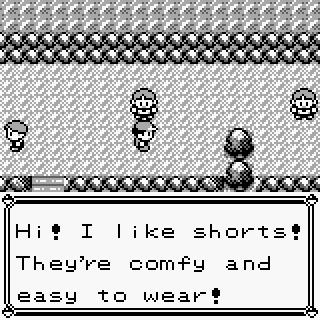
I barely know anything about Pokémon myself, yet even I still remember this line 20 years after playing the original games. I remember it felt like such a weird, random thing for an NPC to say, and apparently I wasn’t alone. It’s become a meme and has been kept in many Pokémon games since then.
So this got me wondering: what does the original Japanese text say? And is it as popular of a quote in Japan? Let’s take a look!
Original Line
Here’s the actual quote in question, as seen in Pokémon Red:
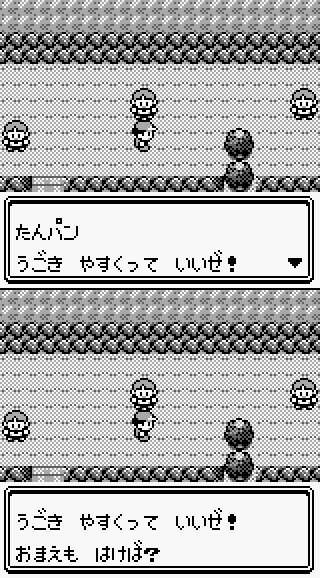 | 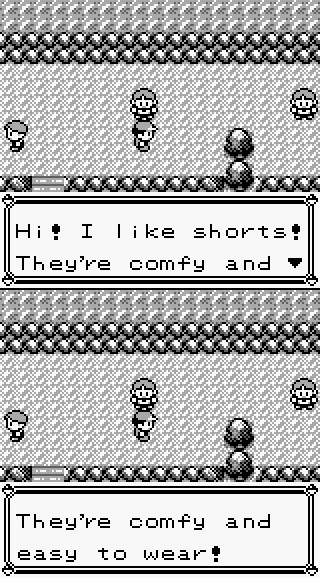 |
| Pocket Monsters Red (Game Boy) | Pokémon Red (Game Boy) |
| Japanese Version (basic translation) | English Translation |
| Shorts are nice and easy to move around in! Why don’t you wear some too? | Hi! I like shorts! They’re comfy and easy to wear! |
The first thing I notice is that the Japanese shorts line feels like a self-observation and a suggestion directed at the main character. The Japanese line also mentions that shorts are easy to move around in, which fits the character and the setting. He’s a Pokémon trainer and has to go around training and fighting and catching stuff in the wilderness, so being properly clothed is important.
In contrast, the English line feels more like a random statement that comes out of nowhere and has little relevance to anything. It reminds me a bit of Ralph Wiggum from The Simpsons and all his weird, random lines too – stuff like “my cat’s breath smells like cat food” and “my parents won’t let me use scissors”. Now that I think about it, those quotes have a very similar and beloved reputation too.
In Context
The topic of shorts also makes more sense in the Japanese version because these male trainers are called たんパンこぞう (tanpan kozō), which means something like “Shorts Rascal” or “Shorts Kid”. But in the English text, they’re called “Youngster”.
So of course it makes sense for a “Shorts Rascal” to talk about shorts – the connection is obvious. A random “Youngster” talking about shorts, on the other hand, makes it seem like he brought up the topic out of nowhere. Sure, you can see that he’s wearing shorts in battle, but the text connection helps link everything more clearly in Japanese.
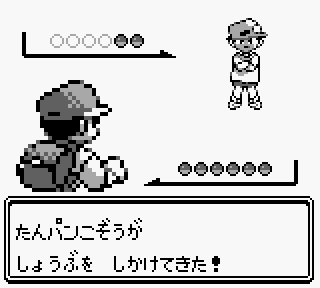 | 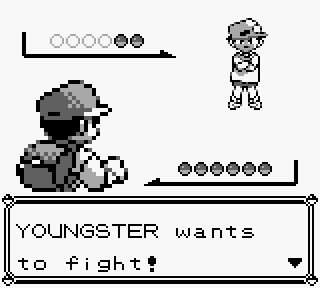 |
| Pocket Monsters Red (Game Boy) | Pokémon Red (Game Boy) |
Popularity
If you do a Google search or YouTube search for “comfy and easy to wear” in English, you’ll get an avalanche of results from Pokémon-related content. Here’s what comes up in a simple Google Image search:
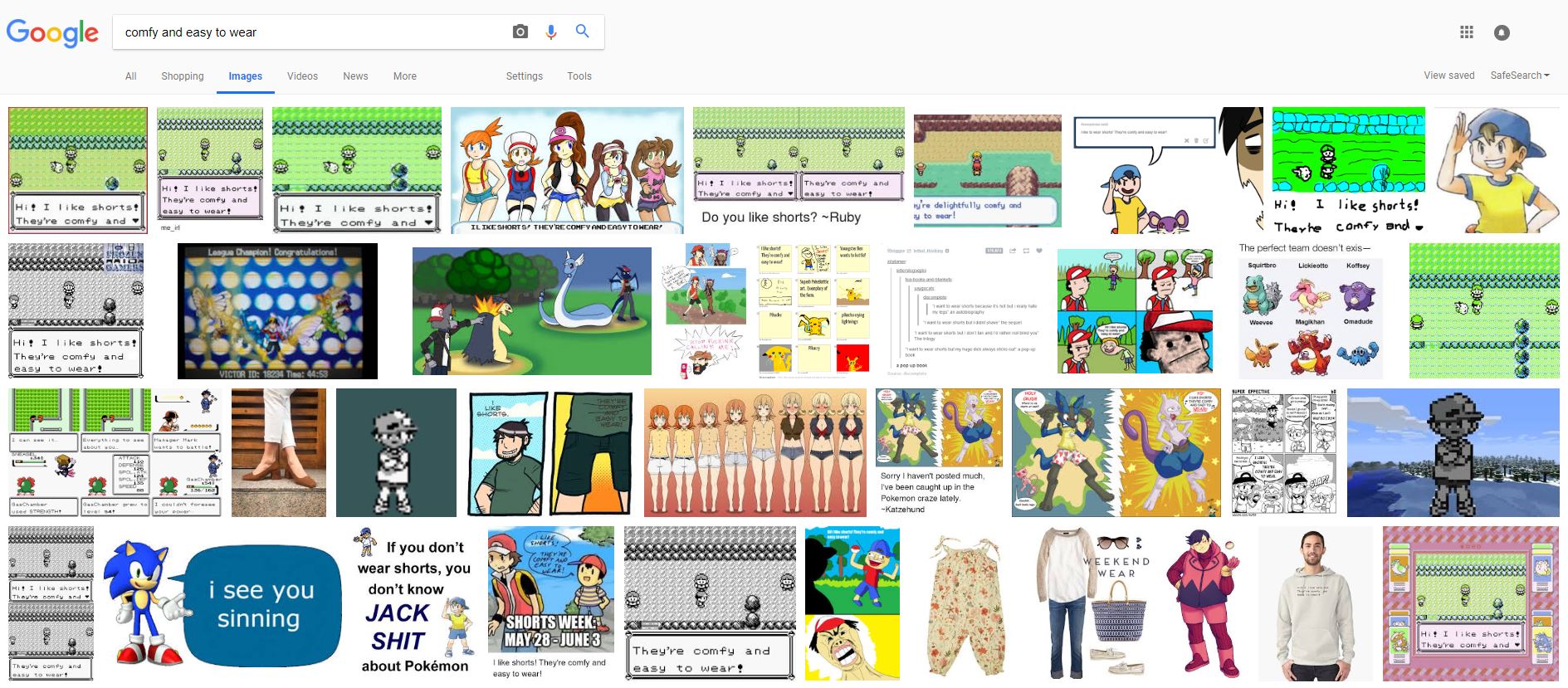
As we can see, it’s almost entirely Pokémon-related stuff. But if you try the Japanese quote or any of its variations, the results aren’t quite as intense:
Of course, search result comparisons don’t exactly prove how popular or beloved stuff can be among fans, but I thought I’d share my results anyway just for curiosity’s sake. Again, I’m not much of a Pokémon guru, so if anyone out there can shed more light on the popularity of this quote in Japan and in other countries, let me know in the comments or on Twitter!
Summary
For Japanese Pokémon players, this trainer’s line was a quirky yet logical statement, while the perceived randomness and phrasing of the translated line made it quirky and memorable for those who played the English version.
If you enjoyed this quick look at Pokémon translation differences, check out all these other articles I've written too!


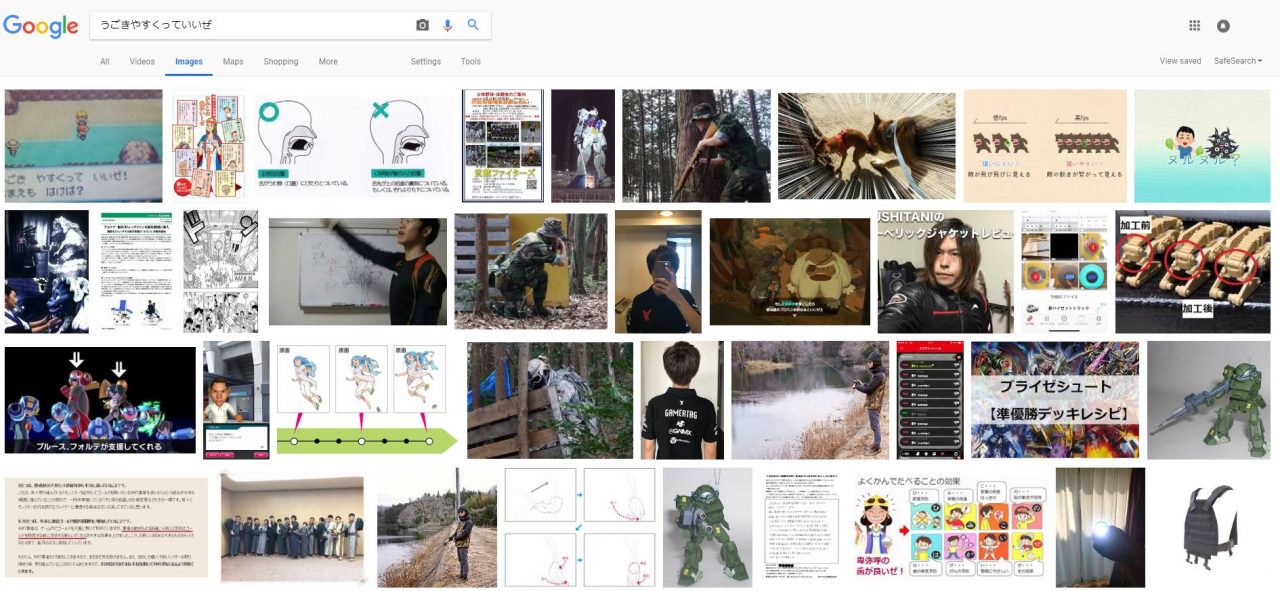
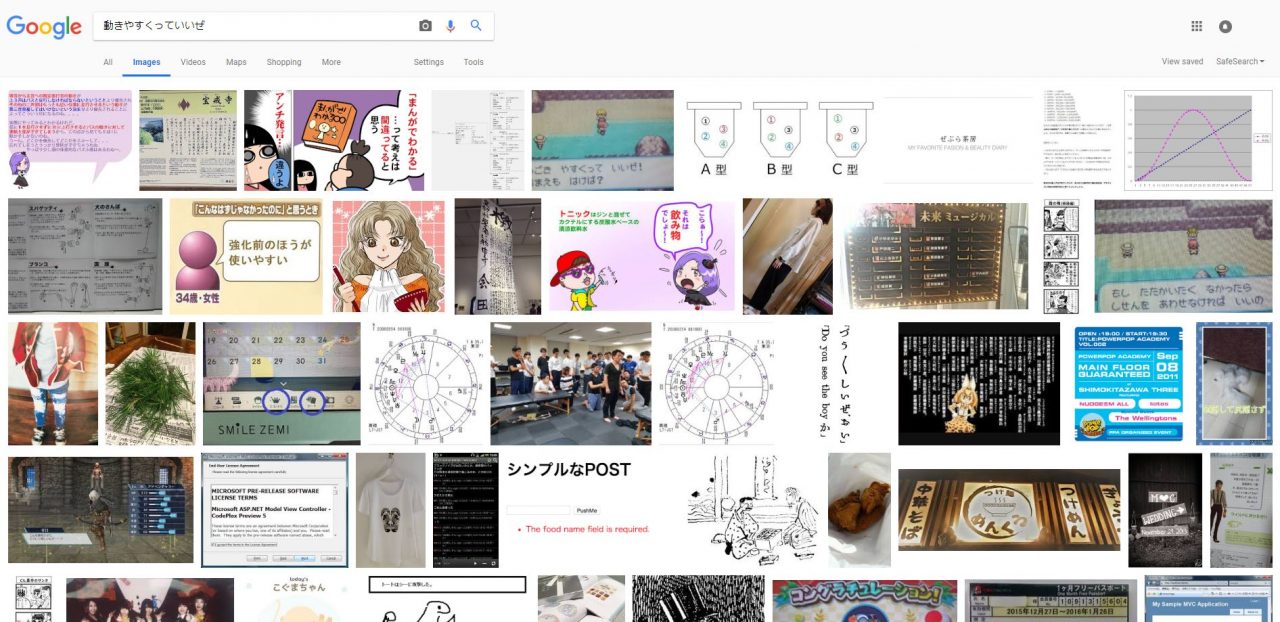
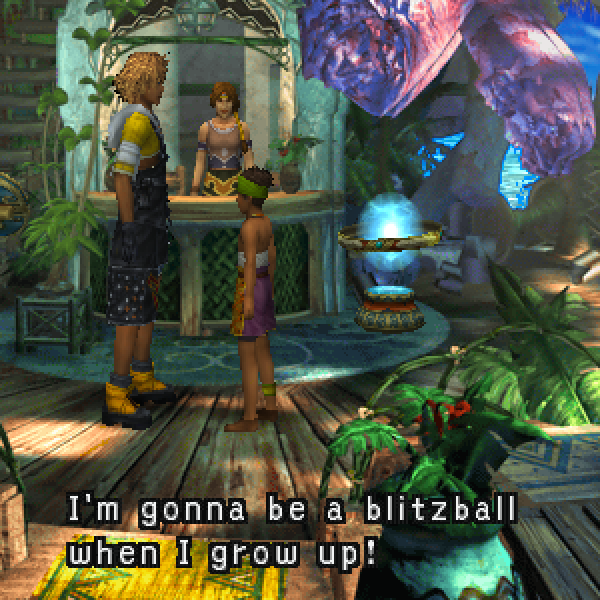
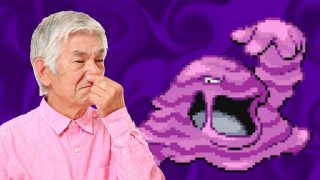
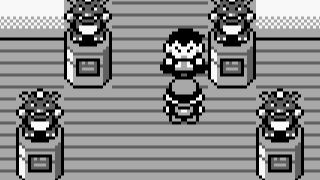
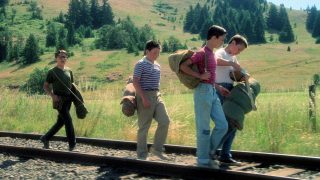
If you ever plan to do this game, Mato, just hit me up and I’ll tell you how to breeze through it since I know you’re a busy man. I just hope you do this before my own kids start playing Pokemon. 😛
I like Pokemon and it’d be cool to know the translation differences.
The translator of the pokemon games answered some questions about the translation on a Something Awful thread once, including this one! Doug Dinsdale is his name AND screen name, here is a txt document containing the interesting bits (and a few programming qandas from different people, as the thread was for the let’s break pkmn blue LP) http://lparchive.org/Pokemon-Blue/code.html
“But the shorts line is a direct translation. It’s such an (in)famous line, I figured that confirmation that, yes, that IS what the kid’s really saying, is worth preserving.”
actually his real name is Nob Ogasawara. he seems like a really nice dude and it’s always cool to hear about which games his kids are loving these days :3
Actually, there’s a specific line in these games where I’d love to know the original line was.
There’s this Lass (“Miniskirt” in the japanese games, I think?) before Rock Tunnel on Route 10 that says
“The Pokemon here are so chunky! There should be a pink one with a floral pattern!”
that people are using to say Munna (5th gen Pokemon) was reference to/planned since gen 1
Always been curious to know if the line is the same/similar in the originals
I checked just now and yep, it’s pretty much the same in the Japanese version. Even though there’s nothing really different I’ll probably make a post about it too, just because it seems to be one of those things people talk about.
I’d be so down for a Pokemon comparison. Since I started learning Japanese Red/Blue have been on my shortlist of games to import for practice.
I think if you did a Pokemon comparison it would go really well just because so many people would reply to your Tweets when you need help understanding something about the series. xD It’s the one I want to see most right behind Mother 3. I make one vote for Pokemon! You should let us vote with donations on which game you should do next. :p Just like the current update thingy you have in place. Haha! Then the majority gets what they want and you get extra cash from it… Just a thought.
The Pokemon fandom is pretty starved of people who know ANY Japanese at all, so there’s a lot less comparisons out there than you’d think.
If you want an interesting topic for a post, though, here’s a dialogue from the old man who teaches you to catch Pokemon. It got censored a bit in the translation.
Granddaughter: あらら じいちゃん!こんな ところで ねちゃってしょーが ないわね!よいが さめるまで まつしかないわ
Old Man: ういーっ! ひっく…… まちやがれ!わしの はなしを きけ!…… こら!いくな! と いっとろーが!
and later
Old Man: うーん……よっぱらってた みたいじゃ!あたまが いたい……
and as officially translated:
Granddaughter: Oh Grandpa! Don’t be so mean! He hasn’t had his coffee yet.
Old Man: You can’t go through here! This is private property!
and later
Old Man: Ahh, I’ve had my coffee now and I feel great! Sure you can go through!
That’s the only really interesting change I recall in the entire game, though I’ve never looked at it in extreme detail.
There’s also “ポナヤツングスカ してん” being changed to “Tiksi Branch” I guess, but that’s just a single name, not a piece of dialogue.
Oh, and this bit, the text box you get if you look at the map in your rival’s house before his sister gives it to you.
In the original, it says “カントー ちほうの ちずだ! …… もらえたら うれしい?”
In the translation it says “It’s a big map! This is useful!”
Only mention of the name “Kanto” in the entire game, and the localizers remove it.
I think it was removed because Kanto hadn’t been named yet!
While localizing Gen 1, there was a ton of names that hadn’t gotten Legal clearance, so I was told to leave it blank…and then go back and fill in the blanks later.
Apparently, not all the blanks were filled in by the put-upon translator.
And then, just to add insult to more insult, when they did decide on an official English name for the Generation 1 region, they just called it the “Kanto Region” anyway (making it one of the few direct references to Japanese culture in the franchise at the time that wasn’t changed in localization, since the Kanto Region is also the only region to be named after a real part of the world….)
That’s actually a really interesting difference, though, because in the English version of the game, you could easily assume, at least until later generations came out, that the map covered the entire world the game took place in. But in the Japanese version, it was made clear, even from the very beginning of the first games, that you were only seeing a small part of the world, and there was more exploration to be done further afield.
It’s because of the E10 ratings.
No swearing, no religion (oh, gee thanks, when DPP was ALL about religion), no sexism (so, no Gold Orbs–Nuggets instead), no ageism, no farting, definitely no drug taking (which is why the stoned-off-his-gourd-on-mushrooms Hiker is always the sneezy guy), etc., etc. Oh, and why Vagabond Gamblers turned into Private Eyes.
So, with this old fart blocking the road, he was passed out drunk.
That wasn’t going to fly with Legal, so…Mr. Coffee was born.
By and large, I hewed close to the JP text–I’m not very comfortable with adding stuff that’s not in the original. And moreso because most localizations to Euro languages, etc., were based off the English translations I produced.
Ah! You had said that DPPt was hard to translate because of Cyrus, but what was so difficult? If I recall tu of had said that you couldn’t make religious references but the translation has him saying he’ll be a deity, and that’s exactly the same as saying he’ll be a god. Why was “deity” an OK word to use when it’s literally the same thing?
As a related note, Japanese fans tend to think that Cyrus was the one who wrote the Rotom diary while the English fans tend to think Charon wrote it. Do you know why this would be? In English the diary comes off more…mature and less child like which would make MORE sense for Cyrus, and in the card game, Charon’s only card is about Rotom and he’s making a very odd expression of mixed emotion towards it, so it’s funny how people have gotten this division.
Haha sorry I’m just a big Galactic fan.
Probably because “god” has been co-opted by the Christians and Jews to refer to Jehovah/Yahweh and thus the word always carries those connotations to Westerners even when not used in that context. “Deity” on the other hand is a lot less loaded with cultural and religious significance.
But that’s specifically God with the capital G. “god” with an undercase g and “deity” have the same connotations.
Not sure I understand the gold orbs sexism thing.
Apparently, the name that was used for the “Nugget” item in Japanese was 「きんのたま」, which can be literally interpreted as “golden ball(s)” or “golden jewel(s)” (Japanese nouns don’t mark plurals, so the phrase is the same whether it’s referring to one ball or more than one.) In the games, the literal meaning is actually what the item is (and I suppose that’s why the sprite for that item has always looked like a ball, instead of just a chunk of rock,) but the phrase 「きんのたま」 is more commonly used as slang for testicles. Puns about it show up everywhere in Japanese pop culture, and it’s culturally considered benign enough for those puns to be used even in media for children. (A lot of those puns actually still make sense if you use the phrase “family jewels” when translating them into English, so it’s often translated that way, but in American culture, it would be absolutely unheard of to acknowledge that any body parts associated with sex even exist in a game that was marketed to children, so translating it as something like “family jewels” wouldn’t have been feasible.)
As for what’s sexist about it, Bulbapedia says that, in the Japanese version of Gold and Silver, there’s a man who offers you his “golden balls”, and then gives you a Golden Ball item, and in English, the dialogue was changed so that he refers to the English name of the item by offering you a “nugget of wisdom”, which is kind of clever. With the possible exception of that example, though, “vulgarity” might have actually been a more appropriate description than “sexism” for why the item’s name had to be changed.
“Kintama” is slang for testicles. “Kin no tama” is not. Yes, there’s lines in the game that are meant to make you think of kintama, but it’s not literally what they’re saying.
…so what about Gold and Silver and the kid with the top percentage Rattata?
Who would want to wear shorts while walking through the tall grass in the game? There are probably Pokemon ticks that carry Poke Lyme Disease. Or maybe that is how Pokerus got started?
This site has influenced me to make a patch for FireRed to delocalize as much as possible and use the Japanese terms were possible. Wish I knew more Japanese so I know I’m not making any mistakes. But, overall other than some censorship here and there. Comparing the little bit of Japanese I do know to the English. Most of the game is accurately translated. Luckily the Pokémon games are just Katakana and Hiragana. Which is easier since I still only know a handful of Kanji.
Lol, you aren’t going to do any such thing. Don’t make silly declarations in the name of staying pure to Japan or whatever nonsense you weebs spout.
He’s in Pokemon X and Y, also. He’s on Route 5.
Again later on, too. Game just has a thing for shorts!
I’d like to note that references to this line are EVERYWHERE in Style Savvy: Trendsetters (which is surprisingly good actually). The random nature of customers/their requests stops it from getting TOO repetitive, but it’s distinctive enough to remember, so the translators clearly didn’t check (or care) if they used the reference already.
This line is also referenced in Last Window: Secret of Cape West for the DS. The protagonist, Kyle Hyde says something along the lines of “I like suits. They’re comfy and easy to wear.” when you examine his closet, since it’s full of suits.
I wonder if the line was similar to this in the Japanese version, but I doubt it.
I believe there’s a random Youngster opponent in the Platinum/HeartGold/SoulSilver Battle Frontier who calls himself “King of the Shorts”. And there’s a girl in Black2/White2 who calls her cotton dress “comfy and easy to wear”.
Seems like the easiest translation would be “Shorts are comfy. Why don’t you wear them?”
Now that is interesting. I never knew about this line; the german version has this character complaining about his shorts because of all the nettles he walks into.
This is complemented by one of the other trainers in the same area who claims to have pulled a prank on his brother by convincing him to wear shorts.
Why did this old article suddenly show up in my feed? Did you update it with some new information or something?
Yeah, I occasionally revisit old articles and rewrite/redo/rework them.
“As we can see, it’s almost entirely Pokémon-related stuff.”
…and uhh Sonic judging me, for some reason. Mind your own business, Sonic.
Hopefully you can do more Pokemon related stuff at some point. It’s certainly interesting to note that the early Pokemon games at least were all Kana with no Kanji in sight. Sure, Game Boy limitations might be at play here but considering how Children’s games would use Kanji with Furigana attached, this makes Pokemon games stand out in that regard.
It’s neither interesting nor makes them stand out in the slightest. Game Boy games very very rarely used kanji, and they most definitely didn’t use furigana. There’s no room.
True. But in general I’m somewhat interested in how Kanji and Kana are handled in first place. Games mainly intended for children would usually have furigana as an aid but this isn’t a hard rule by any means. Whether it’s due to technical limitations (Link to the Past) or they just simply don’t care (Kingdom Hearts). Note that basically every console Zelda game from Wind Waker always uses Furigana in text.